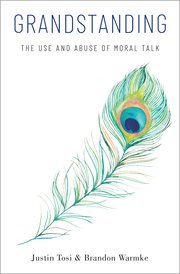"Grandstanding: The Use and Abuse of Moral Talk" by Tosi and Warmke. A Review
Grandstanding:
The Use and Abuse of Moral Talk
Justin Tosi and Brandon Warmke
Oxford University Press
ISBN: 9780190900151; July 2020; $19.95
It’s melting the internet and burning
up several news outlets. It makes informed dialogue among people nearly
impossible, cracking up the sense of and desire for the common good. It looks
and feels like chest-thumping and cock-strutting, and is turning up, with
greater intensity, in the Whitehouse, the publishing house, and at the alehouse.
Recently, a well-documented 248-page hardback has arrived on the scene
diagnosing this “more-heat-than-light” predicament, “Grandstanding: The Use and
Abuse of Moral Talk”. The authors, Justin Tosi - Assistant Professor of
Philosophy at Texas Tech University, and Brandon Warmke - Assistant Professor
of Philosophy at Bowling Green State University, want to foster moral talk, but
find huge obstacles. “People need to be able to talk about justice, freedom,
equality, and the right thing to do. But we need to do so in ways that do good,
and not just make ourselves look good. Grandstanders are too concerned with the
latter” (ix). It’s an easy-to-read volume, accessible to older students,
professors, pastors, and folks from almost any walk of life.
“Grandstanding” has a simple order to
it. After the birds-eye view from the preface, the authors then draw out seven
chapters that expose what grandstanding is, looks and sounds like from social
media to politics. The final chapter is a “what do we do with this knowledge”
and goes where readers may not fully expect. Each chapter is chock-full of true-to-life,
documented illustrations, and careful analysis of every case. And the endnotes
are splashing over with references and documentation. It may be a smallish
book, but it carries a weighty credibility.
Tosi and Warmke promote the value and
significance of moral talk. From one end of the volume to the other, they stand
up for it (6). The problem, as they see it, is that grandstanding actually
shuts down moral conversation. “Unfortunately, many people use moral talk irresponsibly.
They use it to humiliate, intimidate, and threaten people they dislike, impress
their friends, feel better about themselves, and make people less suspicious
about their own misconduct…For these people, moral talk is magic…magically
transforms your nasty, abusive, selfish behavior into something heroic and
praiseworthy” (5). To take this approach, then, undermines our efforts at moral
improvement (6, 10). Grandstanding also turns public discourse into a war of
moral one-upmanship (10).
Why do people grandstand? Tosi and
Warmke give several motives (14-23). There is recognition desire, where we want
others to think we’re morally impressive and respectable. There is also the urge
to dominate others. This is the move one makes to take others down a notch or
three with a “Shut up and submit to my view of the world or I’ll shame and embarrass
you! I’m the morally good one here” (17)! Another intention is the need to
express ourselves in ways “to get people to believe that” we “are morally
special” (18). The authors further tackle the various techniques people use,
such as implication, indirect language, humble-bragging, moral
self-enhancement, to name a few. One of the humorous findings the authors
mention is how people normally think they are more moral than they really are –
the illusion of moral superiority (25), and they present studies that back this
up. I appreciated how they clearly show that grandstanding is neither a Republican
nor Democrat issue but crosses the political/social spectrum. The downside is
that centrists (where most people are) end up shutting themselves out of moral
talk because of the grandstanding. In interesting ways, grandstanding hampers,
and halters freedom of speech (35). Tosi and Warmke bring out several other
diagnostic tools, which makes this an extremely helpful guide.
According to the authors,
grandstanding has been with us all along, but now, with the ease with which the
masses can air their prejudices, politics, plots and plans, it is harder to
avoid seeing grandstanding than ever before (xi). They are careful not to lay
the fault on social media as the main culprit, though many of their characterizations
explode onto every virtual platform one visits.
As a reader dives into the book, it
will become clear that the authors are undressing motivations, and that is a
tricky place to be. Tosi and Warmke recognize this and give many hearty
cautions and healthy counsels. Ultimately, the book is primarily for the reader
to evaluate themself if they dare. As the authors say early on, this “book is
about looking at ourselves squarely and honestly and asking whether we are doing
good with our moral talk, or just trying to look good” (10). And that
is where they return in their final chapter, “What to Do About Grandstanding?”
If a reader has any self-awareness as they read, there will be lots of internal
reflection. As my grandmother used to say, “Boy, when you point that finger at
others, just remember, there are three more pointing right back at you!” I was
tempted, page-after-page, to wish so-and-so would read this book, and then
found myself hanging my head as I recognized that I have done these very
things.
“Grandstanding” will kick one’s
backside, but not self-righteously or sanctimoniously. The authors see their
own faults and write from that place. This book is perfect for individual
readers, book clubs, Adult Christian Education classes, Seminary and Bible
College classes, and church leadership boards. It is a must, especially if you
are engaged on social media, or are a public figure. I highly recommend the
book.
My thanks to the authors and Oxford University Press. I heard the authors interviewed on a podcast about the book and immediately asked them for a copy to review. They referred me to the publisher who promptly sent me an electronic version used for this evaluation. No one made any demands on me, therefore my analysis is freely made and freely given.




Comments